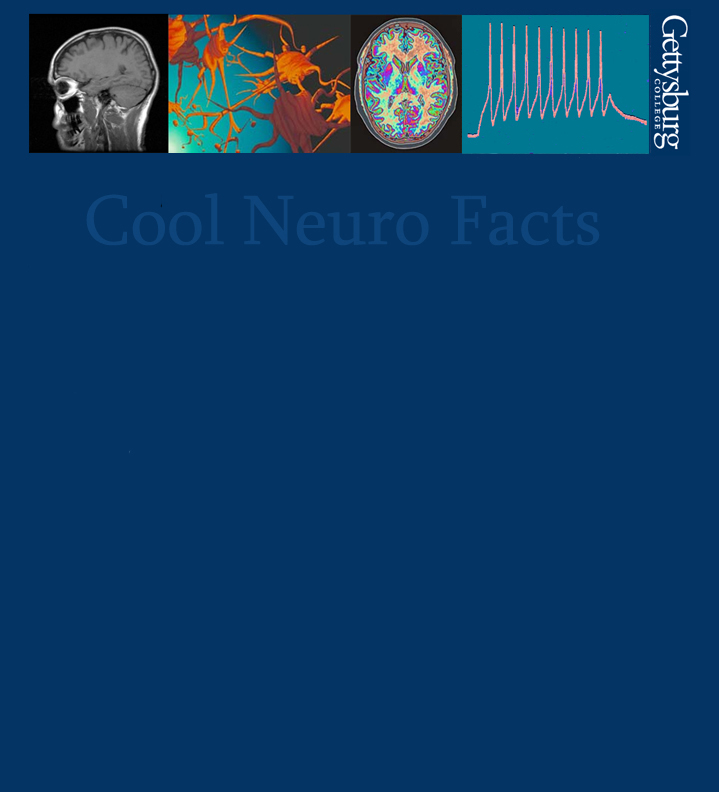The adult human brain weighs about 3 pounds (1,300-1,400 g).
The adult human brain is about 2% of the total body weight.
The elephant brain weighs about 6,000 g.
The cat brain weighs about 30 g.
The average human brain is 140 mm wide.
The average human brain is 167 mm long.
The average human brain is 93 mm high.
The human brain has about 100,000,000,000 (100 billion) neurons.
The octopus brain has about 300 million neurons.
The total surface area of the cerebral cortex is about 2500 sq. cm (~2.5 ft2)
The world record for time without sleep is 264 hours (11 days) by Randy Gardner in 1965.
Unconsciousness will occur after 8-10 seconds after loss of blood supply to the brain.
Neurons multiply at a rate 250,000 neurons/minute during early pregnancy.
The weight of an adult human cerebellum is 150 g.
The total volume of cerebrospinal fluid (CSF) is 125-150 ml.
A total of 400-500 ml of cerebrospinal fluid (CSF) is produced every day.
Cerebrospinal fluid is normally clear and colorless.
There are 12 pairs of cranial nerves.
There are 31 pairs of spinal nerves.
There are about 13,500,00 neurons in the human spinal cord.
The human spinal cord is 45 cm long in men and 43 cm long in women.
Humans can hear in the range of 20 Hz to 20,000 Hz.
Rats can hear in the range of 1,000 to 50,000 Hz.
The most sensitive range of human hearing is between 1,000-4,000 Hz.
Pain occurs when sounds are above 130 db.
Hearing damage can occur if people are exposed to sounds above 90 db for an extended period of time.
The total number of human taste buds (tongue, palate, cheeks) is about 10,000.
The total number of human olfactory receptor cells is about 40 million.
The human eyeball is about 24.5 mm long.
The octopus does not have a blind spot.
The total weight of skin in an average adult human is 6 lb.(2.7 kg).
There are 1,000 to 10,000 synapses for a "typical" neuron.
The cell bodies of neurons vary in diameter from 4 microns (granule cell) to 100 microns (motor neuron in cord).
The resting potential in a squid giant axon is -70 mV.
Games
Welcome to NEURO-JEOPARDY (Copyright © 1996-2006,
Eric H. Chudler All Rights Reserved)
Neuro-Jeopardy is a game to test your knowledge about the
nervous system. The game is contained in a Powerpoint file. Therefore,
your computer must have the ability to read ppt files.
When you start the game, you will see a table with six rows and five
columns. Click on any point value to start the game. You will then be
given an answer. Your job is to give the question for the answer. For
example, if the answer is: "Responsible for thinking and planning; located in your head." - your question should be "What is the brain?"
After you give your question or if you cannot think of a question, click
on the "right arrow" key (->) on your keyboard to see the correct
question. To return to the main game board, move your cursor over the picture of the house and start again.
Are you ready to play?
Click to play, when asked click Open. If asked again during gameplay,
click Open. If having difficulty click Save and open from
saved location.
|


